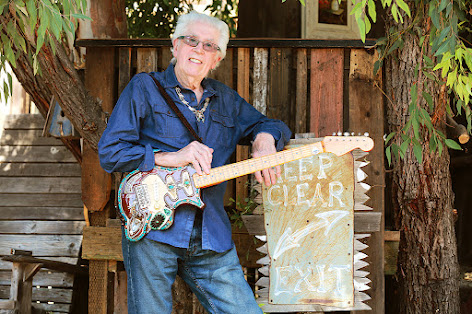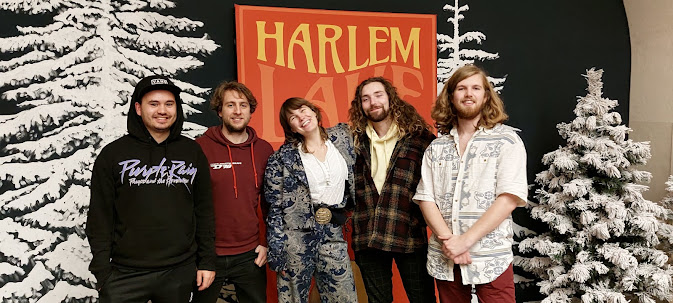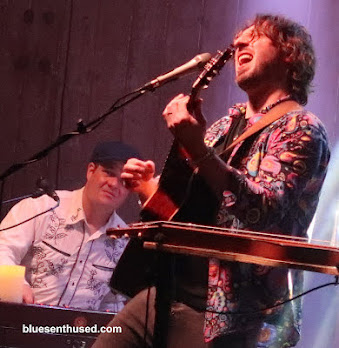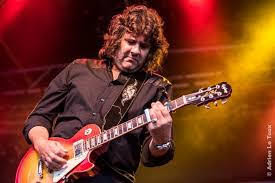Misty Blues may hail from Boston, Massachusetts, and they recorded this, their 11th album, in New York. But the location that springs to mind most often on One Louder is New Orleans.
The spirit of NOLA is especially present when they get funky, as on ‘Do My Thing’, which twitches along on an appealing, Meters-like groove, embellished by hints of Latino rhythm supplied by the added percussion of Yahuba Garcia. It’s there too on ‘Freight Car’, with its funk in a second-line vein rather than hard-pumping James Brownism, and in the briskly funky guitar and horns on the bouncy ‘This Life We Live’.
Thing is though, this element ain’t the be-all and end-all of Misty Blues’ sound. ‘Freight Car’ also
factors in a nagging, tumbling riff, bursts of Morse Code horns, and raw slide guitar from the guesting Justin Johnson, all over a thumping beat, before climaxing with a squealing, cat-attacking-a-scratching post sax solo from Aaron Dean. ‘This Life We Live’ complements the funk with hints of jazz, it also throws some Texas blues-like guitar fills from Seth Fleischmann into the mix to create a real smorgasbord of sounds. Meanwhile the N’Awlins vibe on ‘A Long Hard Way’ comes from Benny Kohn’s trilling barroom piano, but the song itself is a low-key, gospel-inflected piece, while band leader Gina Coleman delivers a poetic lyric about personal challenges in a conversational style.
The contribution of Coleman is significant, as bandleader and chief songwriter, but also with her distinctive, sonorous voice. Her deep, deep tones and occasional line-ending yelps may not be everybody’s cup of joe, and truth to tell that sometimes includes me. But that’s a matter of personal taste, and she still does the business more often than not. On the moody ‘Birch Tree’, for example, with its slow and steady rhythm and flutters of sax and slide, she delivers a lyric full of intriguing images with delicacy and feeling. And on the following, Selwyn Birchwood-like ‘Leave My Home’, she rattles out the rhythmic lines with assertiveness against a backdrop of tickling funk guitar and frothy organ. It’s a track given an additional lift by some call and response sax playing from the aforementioned Dean, in tandem with guest baritone player Chris Rand.
There are two guests bringing extra angles to ‘How The Blues Feels’, a slowie with a hook that evokes ‘Sittin’ On Top Of The World’. Big Llou Johnson duets with Coleman in a languorous, treacly voice, while Bob Stannard adds some harmonica seasoning and ultimately an elegiac solo. It’s guitarist Fleischmann who really grabs the limelight here though, with a stinging, reverb-heavy solo. ‘Seal Your Fate’ brings some zydeco to the table, with the requisite accordion textures supplied by David Vittone over a “shave-and-a-haircut, two-bits” rhythm, while Kohn serves up some rinky dink, jazzy piano, and Fleischmann inserts a playful guitar break. As elsewhere, they sure pack plenty into four minutes or so. And on the closing ‘Take A Long Ride’ they make the most of having Joe Louis Walker as a fellow traveller on guitar and backing vocals. It’s slow and steady, brooding and tense, gradually energised by horn riffing, until Walker cuts loose with a solo that’s by turns teasing, suspenseful, and finally warped and wild, matched at the end by another tempest of a sax break from Dean.
You’ll have gathered by now that while guitar plays its part in the Misty Blues sound, it doesn’t dominate proceedings. One Louder isn’t, as it were, turned up to 11. Instead it’s a team effort, drawing on all concerned to create a multi-faceted sound, and with the benefit of Coleman’s imaginative wordsmithery conjuring up something both authentic and all different.
One Louder is available now on Lunaria Records, and can be ordered here.
The spirit of NOLA is especially present when they get funky, as on ‘Do My Thing’, which twitches along on an appealing, Meters-like groove, embellished by hints of Latino rhythm supplied by the added percussion of Yahuba Garcia. It’s there too on ‘Freight Car’, with its funk in a second-line vein rather than hard-pumping James Brownism, and in the briskly funky guitar and horns on the bouncy ‘This Life We Live’.
Thing is though, this element ain’t the be-all and end-all of Misty Blues’ sound. ‘Freight Car’ also
 |
| "Hey Seth, you ready to rock?" "Er . . . " |
The contribution of Coleman is significant, as bandleader and chief songwriter, but also with her distinctive, sonorous voice. Her deep, deep tones and occasional line-ending yelps may not be everybody’s cup of joe, and truth to tell that sometimes includes me. But that’s a matter of personal taste, and she still does the business more often than not. On the moody ‘Birch Tree’, for example, with its slow and steady rhythm and flutters of sax and slide, she delivers a lyric full of intriguing images with delicacy and feeling. And on the following, Selwyn Birchwood-like ‘Leave My Home’, she rattles out the rhythmic lines with assertiveness against a backdrop of tickling funk guitar and frothy organ. It’s a track given an additional lift by some call and response sax playing from the aforementioned Dean, in tandem with guest baritone player Chris Rand.
There are two guests bringing extra angles to ‘How The Blues Feels’, a slowie with a hook that evokes ‘Sittin’ On Top Of The World’. Big Llou Johnson duets with Coleman in a languorous, treacly voice, while Bob Stannard adds some harmonica seasoning and ultimately an elegiac solo. It’s guitarist Fleischmann who really grabs the limelight here though, with a stinging, reverb-heavy solo. ‘Seal Your Fate’ brings some zydeco to the table, with the requisite accordion textures supplied by David Vittone over a “shave-and-a-haircut, two-bits” rhythm, while Kohn serves up some rinky dink, jazzy piano, and Fleischmann inserts a playful guitar break. As elsewhere, they sure pack plenty into four minutes or so. And on the closing ‘Take A Long Ride’ they make the most of having Joe Louis Walker as a fellow traveller on guitar and backing vocals. It’s slow and steady, brooding and tense, gradually energised by horn riffing, until Walker cuts loose with a solo that’s by turns teasing, suspenseful, and finally warped and wild, matched at the end by another tempest of a sax break from Dean.
You’ll have gathered by now that while guitar plays its part in the Misty Blues sound, it doesn’t dominate proceedings. One Louder isn’t, as it were, turned up to 11. Instead it’s a team effort, drawing on all concerned to create a multi-faceted sound, and with the benefit of Coleman’s imaginative wordsmithery conjuring up something both authentic and all different.
One Louder is available now on Lunaria Records, and can be ordered here.










